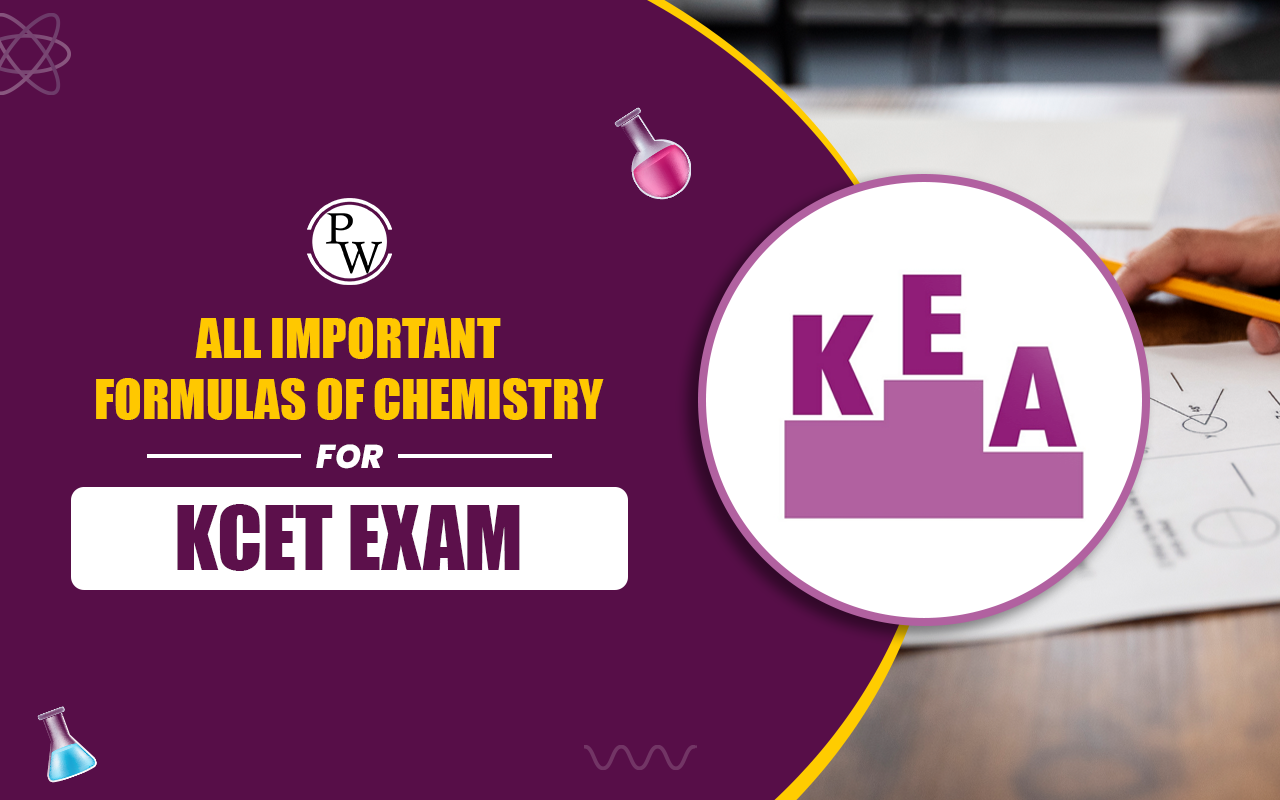

All Important Formulas of Chemistry for KCET Exam : Are you preparing for the Karnataka Common Entrance Test (KCET) scheduled for April 18 and 19, 2024? A solid grasp of Chemistry formulas is essential for success. These formulas form the foundation for solving various problems in Physical, Inorganic, and Organic Chemistry.
Having a comprehensive list of these formulas enables quick revision, enhances problem-solving speed, and boosts confidence during the exam. This compilation covers key formulas across all major topics, serving as a valuable resource for your KCET preparation .All Important Formulas of Chemistry for KCET Exam
All essential Chemistry formulas for the KCET Exam are provided below, organized by important topics. This collection covers key formulas to help with quick revision and efficient problem-solving.| All Important Formulas of Chemistry for KCET Exam | ||
|---|---|---|
| Topic | Formula | Description |
| Mole Concept | n = m / M | Number of moles (n) equals mass (m) divided by molar mass (M). |
| Molarity (M) | M = n / V | Molarity is moles of solute per litre of solution. |
| Normality (N) | N = Equivalent moles / V | Normality is equivalent moles of solute per litre of solution. |
| Molality (m) | m = n / mass of solvent (kg) | Molality is moles of solute per kilogram of solvent. |
| Ideal Gas Law | PV = nRT | Relationship between pressure (P), volume (V), moles (n), gas constant (R), and temperature (T). |
| Boyle's Law | P1V1 = P2V2 | For a given mass of gas at constant temperature, pressure is inversely proportional to volume. |
| Charles's Law | V1 / T1 = V2 / T2 | Volume of a gas is directly proportional to its temperature at constant pressure. |
| Avogadro's Law | V1 / n1 = V2 / n2 | Equal volumes of gases contain equal numbers of moles at constant temperature and pressure. |
| Raoult's Law | Psolution = Xsolvent x Psolvent | Vapor pressure of a solution is proportional to the mole fraction of the solvent. |
| Osmotic Pressure (π) | π = MRT | Osmotic pressure is the product of molarity (M), gas constant (R), and temperature (T). |
| pH and pOH | pH = -log[H+] | pH is the negative logarithm of hydrogen ion concentration. |
| pOH = -log[OH-] | pOH is the negative logarithm of hydroxide ion concentration. | |
| pH + pOH = 14 | Sum of pH and pOH in aqueous solutions at 25°C. | |
| Nernst Equation | E = E0 - (0.0591 / n) log Q | Calculates cell potential under non-standard conditions. |
| Gibbs Free Energy (ΔG) | ΔG = ΔH - TΔS | Relationship between enthalpy (ΔH), temperature (T), and entropy (ΔS). |
| ΔG = -nFE | Relates Gibbs free energy to cell potential (E). | |
| Arrhenius Equation | k = A e^(-Ea / RT) | Describes the temperature dependence of reaction rates. |
| Hardness of Water | Hardness (mg/L CaCO3) = (Mass of CaCO3 / Volume of water (L)) x 1000 | Measures concentration of calcium carbonate in water. |
| Equivalent Weight | Equivalent weight = Molar mass / Valency | Used in titration calculations. |
| Faraday's Laws of Electrolysis | m = (Q / F) x (M / n) | Mass (m) of substance deposited during electrolysis. |
| General Formula for Alkanes | CnH2n+2 | Saturated hydrocarbons. |
| General Formula for Alkenes | CnH2n | Unsaturated hydrocarbons with one double bond. |
| General Formula for Alkynes | CnH2n-2 | Unsaturated hydrocarbons with one triple bond. |
| Alcohol Functional Group | R-OH | Hydroxyl group attached to an alkyl chain. |
| Aldehyde Functional Group | R-CHO | Carbonyl group at the end of an alkyl chain. |
| Ketone Functional Group | R-CO-R' | Carbonyl group within an alkyl chain. |
| Carboxylic Acid Functional Group | R-COOH | Carboxyl group attached to an alkyl chain. |
| Ester Functional Group | R-COO-R' | Formed from the reaction between an acid and an alcohol. |
| Amine Functional Group | R-NH2 | Contains a nitrogen atom bonded to alkyl groups. |
| Amide Functional Group | R-CONH2 | Contains a carbonyl group bonded to a nitrogen atom. |
All Important Formulas of Chemistry for KCET Exam PDF Download
Accessing a comprehensive PDF of essential Chemistry formulas is crucial for excelling in the Karnataka Common Entrance Test (KCET). This resource facilitates quick revision, enhances problem-solving speed, and boosts confidence during the exam. To download the PDF, please visit the link below:All Important Formulas of Chemistry for KCET Exam PDF
Benefits of All Important Chemistry Formulas Sheet for KCET Exam
Quick Revision - A formula sheet makes revision quick and efficient, saving valuable time during exam preparation. With all essential formulas in one place, students can review them easily without flipping through heavy textbooks.
Boosts Problem-Solving Speed - With a well-organized formula sheet, students can locate formulas instantly, which helps them solve problems faster. This speed is especially helpful in a time-bound exam like KCET, where every second counts.
Reduces Stress and Builds Confidence - Having all key formulas compiled in one place reduces stress and builds confidence. Students feel more prepared, knowing they have everything needed for quick reference during the exam.
Improves Focus on Application - By eliminating the need to recall each formula, a formula sheet allows students to focus on applying formulas to solve problems. This shift in focus improves understanding and approach to different types of questions.
Minimizes Mistakes - Using a formula sheet minimizes mistakes, as students can double-check formulas before starting calculations. This accuracy is essential in Chemistry, where even small errors can change the outcome.
Enhances Last-Minute Preparation - In the final days before the exam, a formula sheet serves as a valuable tool for quick, last-minute reviews. It reinforces memory and boosts familiarity, helping students feel ready and confident on exam day.
All Important Formulas of Chemistry for KCET Exam FAQs
1. How can I identify which Chemistry formulas are most important for KCET?
2. Should I create my own formula sheet or use a pre-made one for KCET Chemistry?
3. What’s the best way to practice Chemistry formulas to ensure accuracy during the KCET exam?
4. How much time should I spend on revising Chemistry formulas in the last month before KCET?
5. Can memorizing Chemistry formulas alone improve my KCET score?












